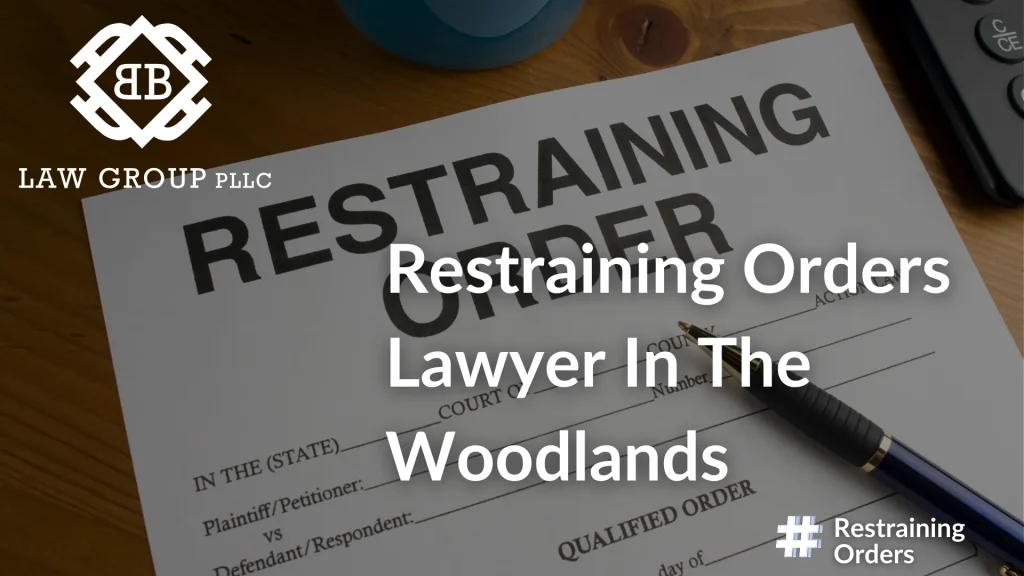Unfortunately, some relationships turn violent, resulting in the physical and/or verbal abuse of one spouse or partner by the other. In some circumstances, this violence can begin with or be exacerbated by a person seeking a separation or divorce from their partner. Such violence that affects you and/or your children can be frightening, especially if you are uncertain about what you can do to put an end to it. Fortunately for those in this situation, a restraining order can help provide the distance and protection that is needed.
At BB Law Group PLLC, we are aware of the struggles that people in The Woodlands face when trying to escape an abusive partner. Nothing is more important than making sure you and your loved ones are protected, and getting a restraining order is often the best way to do this. With the help of a skilled and compassionate legal professional, you can get the restraining order you need quickly.
Effects of Restraining Orders
Restraining orders can provide much-needed protection in a variety of ways, including:
- Stipulating a certain amount of distance to be kept
- Mandating total non-contact between spouses/partners
- Mandating total non-contact between abusive spouse and children
- Put legal consequences in place should the restraining order be violated
These effects of restraining orders can provide protection from an abusive spouse or partner and can give you peace of mind for your own safety and that of your children while you’re completing your separation or divorce.
What is the Difference Between a Restraining Order and a Protective Order?
Ending a relationship is always difficult. Sometimes, it is necessary to take legal steps to keep yourself safe during the process of ending a relationship. In Texas, these are two distinct orders that can be applied in these situations. If you have experienced violence, sometimes called intimate partner violence, in your marriage or other relationship, you may consider obtaining a protective order.
On the other hand, a restraining order may be the best route to go if you are concerned about your spouse’s or partner’s behavior, but they have not previously been violent toward you or nor have they threatened violence. If you are in immediate physical danger, you should call 911. Contacting a lawyer to discuss protective or restraining orders should wait until you are safe.
Restraining Orders
In Texas, restraining orders are common in divorce proceedings. After you file for divorce, you may be afraid that your partner will be violent toward you or your property. A restraining order can legally demand that your spouse leave you and your property alone.
While your divorce is pending, you may need to prevent your spouse or partner from taking actions that will be decided in the course of the proceedings. For example, you may need to stop them from spending all the money that is held jointly in the marriage or relationship.
You may also want to prevent your partner or spouse from contacting you while the divorce is ongoing.
If your spouse or partner has been violent in the past, a protective order may be better since it can be enforced by the police. In Texas, restraining orders are dealt with in the courts. Violators are more likely to be given warnings or fines than time in jail.
Protective Orders
To get a temporary protective order you will need to prove that you are in real danger. Unlike a restraining order, which may be a part of divorce proceedings, this order is reserved for instances when physical danger is apparent to the court. It may also be used to protect a victim after sexual assault or stalking.
According to the law, you will need to prove that you have been hurt or threatened by the person you are asking for protection against. You’ll also need to show that you have reason to believe they may threaten or hurt you again. Finally, except in the case of sexual assault or stalking, you will need to prove that you or your partner have a close relationship with the person you are asking to be protected from.
The criteria for getting a temporary protective order against someone must be true for all of these:
- The aggressor has previously been violent or threatened violence
- The aggressor is likely to be violent again
- The aggressor has a close relationship to you or your partner (except after incidents of sexual assault or stalking)
You will need to go before a judge to ask for a protective order, but you may be able to get something called a “Temporary Ex Parte Protective Order” first. This will cover you until you are able to appear in court. Once it is instituted, the protective order will force the aggressor to leave you alone. If they violate the order, the police can arrest them. They will:
- Not be allowed to hurt or threaten you
- Not be allowed to contact you
- Not be allowed to go near you, your family, your pets, your home, your work, or your children’s schools
- Not be allowed to have a gun, or get a license to carry one
Advantages to Restraining Orders During a Contentious Divorce
 If you are in the process of divorcing your spouse, there are several advantages to seeking restraining orders early. You can use the order to protect yourself financially and physically. It might be best to act proactively if you think your spouse is likely to take advantage of you or to be physically or emotionally threatening.
If you are in the process of divorcing your spouse, there are several advantages to seeking restraining orders early. You can use the order to protect yourself financially and physically. It might be best to act proactively if you think your spouse is likely to take advantage of you or to be physically or emotionally threatening.
Sometimes, people who expect their divorce to be financially damaging can take advantage of Texas community property statutes. Any money that you have made during the course of your marriage is considered the joint property of both spouses under Texas law.
A vindictive spouse could choose to drain your joint bank account entirely so that you no longer have that asset to divide as part of your divorce agreement. A restraining order can mandate that your spouse leave your bank account alone.
If your marriage has deteriorated to the point that your spouse is emotionally abusive, you may want to limit their ability to contact you. If they threaten you physically or harm you, a protective order may be more appropriate. You may also want to stop your spouse from seeing your children. A restraining order can establish temporary custody orders.
Contact a Restraining Orders Attorney in The Woodlands
When you are trying to escape an abusive or violent partner, our lawyers at BB Law Group PLLC can help. Your protection and the protection of any children involved are critical, and, as such, we will do what is needed to get you that protection. Learn more about restraining orders, how one can be valuable to you, and how we can help you put one in place by calling (832) 534-2589.
